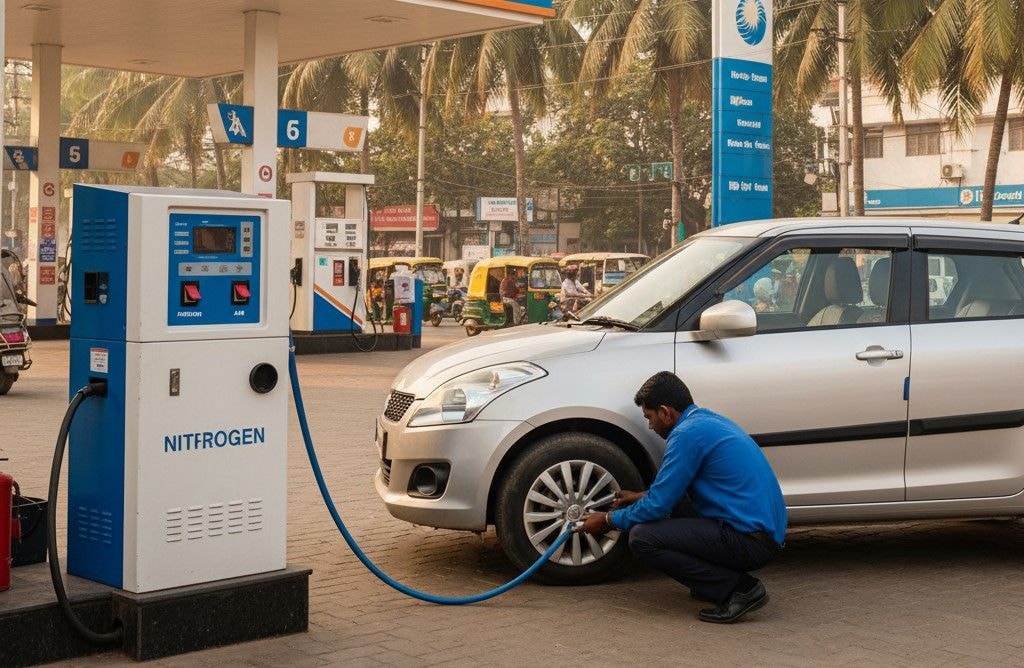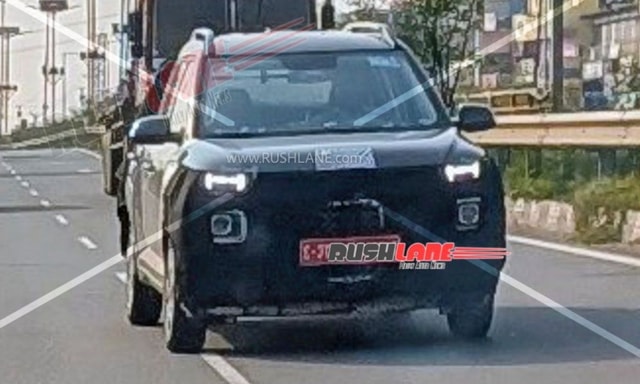Nitrogen In Tyres: The Real Pros and Cons Explained

- Nitrogen in tyres runs it cooler and needs less top ups
- Cost more compared to free air top-up
- It’s a nice-to-have, not a must-have
Every few years, the automotive world rediscovers an old buzzword — nitrogen tyre inflation is one of them. You’ve probably seen that green valve cap at a tyre shop and wondered: “Is nitrogen really better than regular air?” Let’s cut through the marketing fog. Here’s the truth about nitrogen inflation.
What is Nitrogen Tyre Inflation?
Simply put, it’s when your tyres are filled with pure nitrogen gas instead of normal air. Regular air already contains about 78% nitrogen, 21% oxygen, and a bit of moisture. Nitrogen filling takes that to roughly 95–99% nitrogen, removing oxygen and moisture from the equation.
Why does that matter? Because both oxygen and water vapour can influence tyre pressure, rubber ageing, and corrosion, nitrogen is used to minimise those effects.
Advantages of Nitrogen Tyre Inflation
1. Slower Pressure Loss
Nitrogen molecules are larger and less prone to seep through the microscopic pores in tyre rubber. This means your tyre pressure stays more stable for longer. This is especially useful for people who don’t check their pressures regularly (which, let’s be honest, is most of us).
2. Reduced Moisture and Corrosion
Compressed air often contains humidity, which can condense inside the tyre or rim, leading to corrosion over time. Nitrogen is dry, so it keeps the inside of your wheel cleaner, especially important for alloy wheels and vehicles with TPMS sensors.
Also Read: All Sedans In India Under Rs 10 Lakh
3. More Stable Pressure at High Temperatures
During long highway runs, spirited driving, or summer heat, nitrogen-filled tyres tend to expand less compared to air-filled ones. This means comparatively cooler running, more predictable tyre pressures and, in theory, a slightly more consistent handling feel.
Disadvantages of Nitrogen Tyre Inflation
1. Minimal Real-World Benefit for Regular Drivers
Let’s be real; nitrogen in tyres is beneficial if you are performance-oriented or running extreme temperatures. However, regular air already performs well for everyday city and highway driving, provided you maintain proper tyre pressures.
2. Limited Availability and Cost
Not every fuel station or tyre shop offers nitrogen inflation. Even when they do, it is chargeable and often costs Rs 50–200 depending on where you find one. Air, on the other hand, is free and available everywhere.
3. False Sense of Security
Many people switch to nitrogen and then forget about tyre checks altogether. But here’s the kicker – nitrogen or not, you still lose pressure over time. Routine checks are non-negotiable.
Should You Use Nitrogen in Your Car Tyres?
If you’re driving a high-performance car, live in a region with large temperature swings, or simply want longer pressure retention, nitrogen makes sense. Fleet operators and luxury car owners might find the consistency worth the trouble.
But for the average daily commuter, the benefits don’t outweigh the convenience of plain air. Proper maintenance, regular pressure checks, and good driving habits will do more for tyre life and fuel efficiency than anything else ever will.
Verdict
Nitrogen inflation isn’t a scam, but it’s also not a magic trick either. It’s a nice-to-have, not a must-have. Think of it like premium petrol – works great in theory, but not everyone needs it. So, if your local tyre shop offers nitrogen and you don’t mind paying a bit extra, do go for it. If not, regular air is perfectly fine. Just check your tyre pressures monthly, and your car will thank you either way.
Latest News
- Jaiveer Mehra | Jan 30, 2026Jeep India Confirms ‘First Model of Future Lineup’ To Arrive In 2027: What Could It Be?The SUV maker confirmed its first all-new model for India since 2022.1 min read
 Jaiveer Mehra | Jan 30, 2026New Bentley Continental GT S Debuts As Sportier Alternative To Standard CGTThe GT S shaves the 0-100 kmph time down from 3.7 seconds to 3.5 seconds despite not offering any additional power.1 min read
Jaiveer Mehra | Jan 30, 2026New Bentley Continental GT S Debuts As Sportier Alternative To Standard CGTThe GT S shaves the 0-100 kmph time down from 3.7 seconds to 3.5 seconds despite not offering any additional power.1 min read Jaiveer Mehra | Jan 29, 2026Tesla Model S, Model X Production To End By Mid-2026Company CEO Elon Musk made the announcement during the company’s Q4 2025 earnings call.3 mins read
Jaiveer Mehra | Jan 29, 2026Tesla Model S, Model X Production To End By Mid-2026Company CEO Elon Musk made the announcement during the company’s Q4 2025 earnings call.3 mins read car&bike Team | Jan 29, 2026Mahindra Vision S SUV Interior Spied For The First TimeTest mules of the boxy SUV were initially spotted on public roads in mid 2025, with the concept debuting in August.1 min read
car&bike Team | Jan 29, 2026Mahindra Vision S SUV Interior Spied For The First TimeTest mules of the boxy SUV were initially spotted on public roads in mid 2025, with the concept debuting in August.1 min read car&bike Team | Jan 29, 2026Hyundai Exter Facelift Spied Testing Ahead Of India DebutUpdated Exter is expected to make its debut later in the year as Hyundai will look to better compete with the Punch.1 min read
car&bike Team | Jan 29, 2026Hyundai Exter Facelift Spied Testing Ahead Of India DebutUpdated Exter is expected to make its debut later in the year as Hyundai will look to better compete with the Punch.1 min read Janak Sorap | Jan 29, 20262023 World Superbike Championship-winning Ducati Panigale V4 R: Photo GalleryThis one is not tribute bike or a factory replica, but the very machine ridden by Álvaro Bautista during his record-breaking WorldSBK title in the 2023 season.1 min read
Janak Sorap | Jan 29, 20262023 World Superbike Championship-winning Ducati Panigale V4 R: Photo GalleryThis one is not tribute bike or a factory replica, but the very machine ridden by Álvaro Bautista during his record-breaking WorldSBK title in the 2023 season.1 min read
 Bilal Firfiray | Jan 21, 2026Tata Punch Facelift Review: New Turbo Engine; Same Old SoulWith the update, the Tata Punch facelift retains its character of being a healthy runabout, which is perfect for Indian roads. But have these changes made it any better?7 mins read
Bilal Firfiray | Jan 21, 2026Tata Punch Facelift Review: New Turbo Engine; Same Old SoulWith the update, the Tata Punch facelift retains its character of being a healthy runabout, which is perfect for Indian roads. But have these changes made it any better?7 mins read Amaan Ahmed | Jan 17, 2026Bajaj Chetak C25 First Ride Review: Basic, Likeable E-Scooter For First-Time RidersThe Chetak C25, in quite a few ways, is poles apart from the larger and more powerful 30 and 35 Series models, but in its mannerisms, it is very much a Chetak.8 mins read
Amaan Ahmed | Jan 17, 2026Bajaj Chetak C25 First Ride Review: Basic, Likeable E-Scooter For First-Time RidersThe Chetak C25, in quite a few ways, is poles apart from the larger and more powerful 30 and 35 Series models, but in its mannerisms, it is very much a Chetak.8 mins read Bilal Firfiray | Jan 9, 2026Toyota Urban Cruiser Hyryder: 10,000 km Long-Term ReviewAfter spending over three months and 10,000 km with the Toyota Urban Cruiser Hyryder Hybrid, we were impressed by its real-world mileage, seamless hybrid, practical comfort, and Toyota reliability. Is it the best C-SUV then?5 mins read
Bilal Firfiray | Jan 9, 2026Toyota Urban Cruiser Hyryder: 10,000 km Long-Term ReviewAfter spending over three months and 10,000 km with the Toyota Urban Cruiser Hyryder Hybrid, we were impressed by its real-world mileage, seamless hybrid, practical comfort, and Toyota reliability. Is it the best C-SUV then?5 mins read Seshan Vijayraghvan | Jan 8, 20262026 Mahindra XUV 7XO Review: Big On Tech, Bigger On ComfortThe new Mahindra XUV 7XO is flashier, feature packed, and comes with more advanced tech. But are the changes just incremental or actually substantial?1 min read
Seshan Vijayraghvan | Jan 8, 20262026 Mahindra XUV 7XO Review: Big On Tech, Bigger On ComfortThe new Mahindra XUV 7XO is flashier, feature packed, and comes with more advanced tech. But are the changes just incremental or actually substantial?1 min read Preetam Bora | Jan 10, 2026Simple One Gen 2 First Ride Review: 265 km Claimed Range!The Gen 2 model of Simple Energy’s first electric scooter gets a fair few updates, including new features, tech, more range and lighter weight. We spent a couple of hours with the Simple One Gen 2 to find out if it manages to impress.6 mins read
Preetam Bora | Jan 10, 2026Simple One Gen 2 First Ride Review: 265 km Claimed Range!The Gen 2 model of Simple Energy’s first electric scooter gets a fair few updates, including new features, tech, more range and lighter weight. We spent a couple of hours with the Simple One Gen 2 to find out if it manages to impress.6 mins read





















































































































